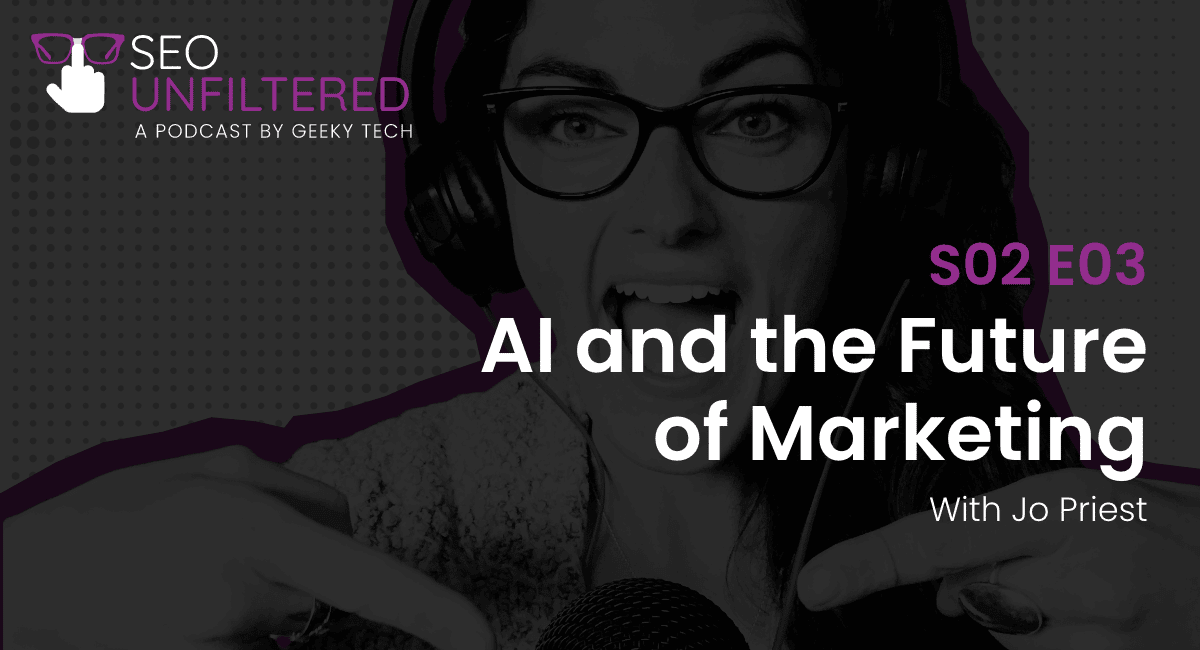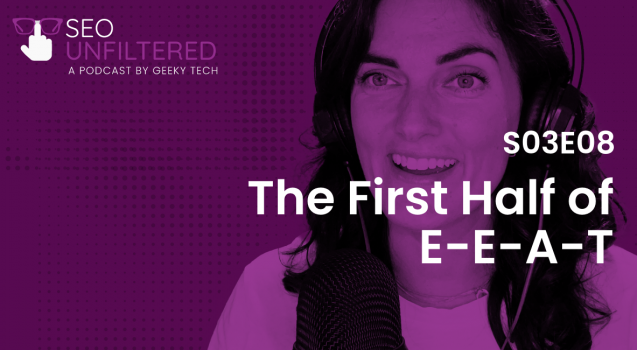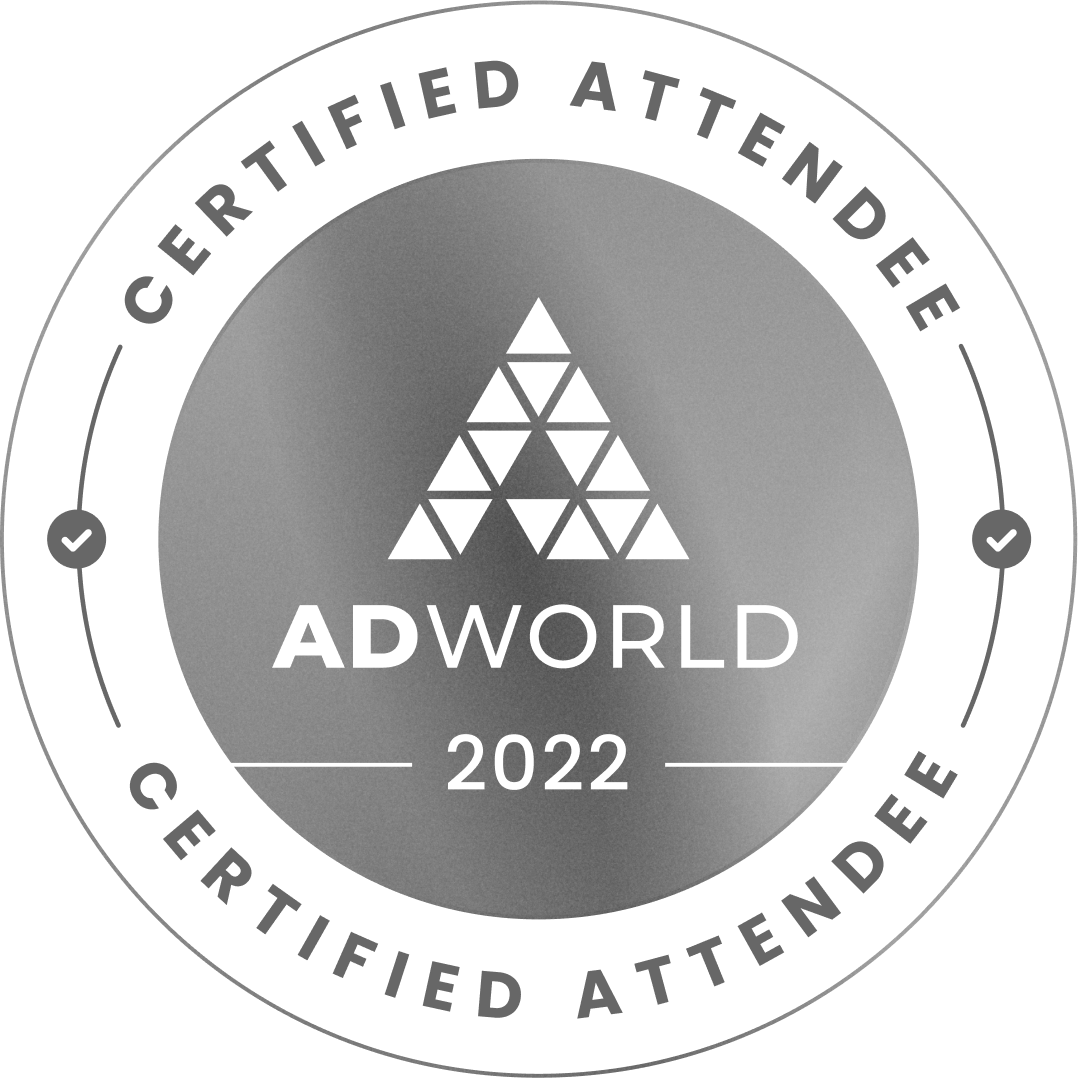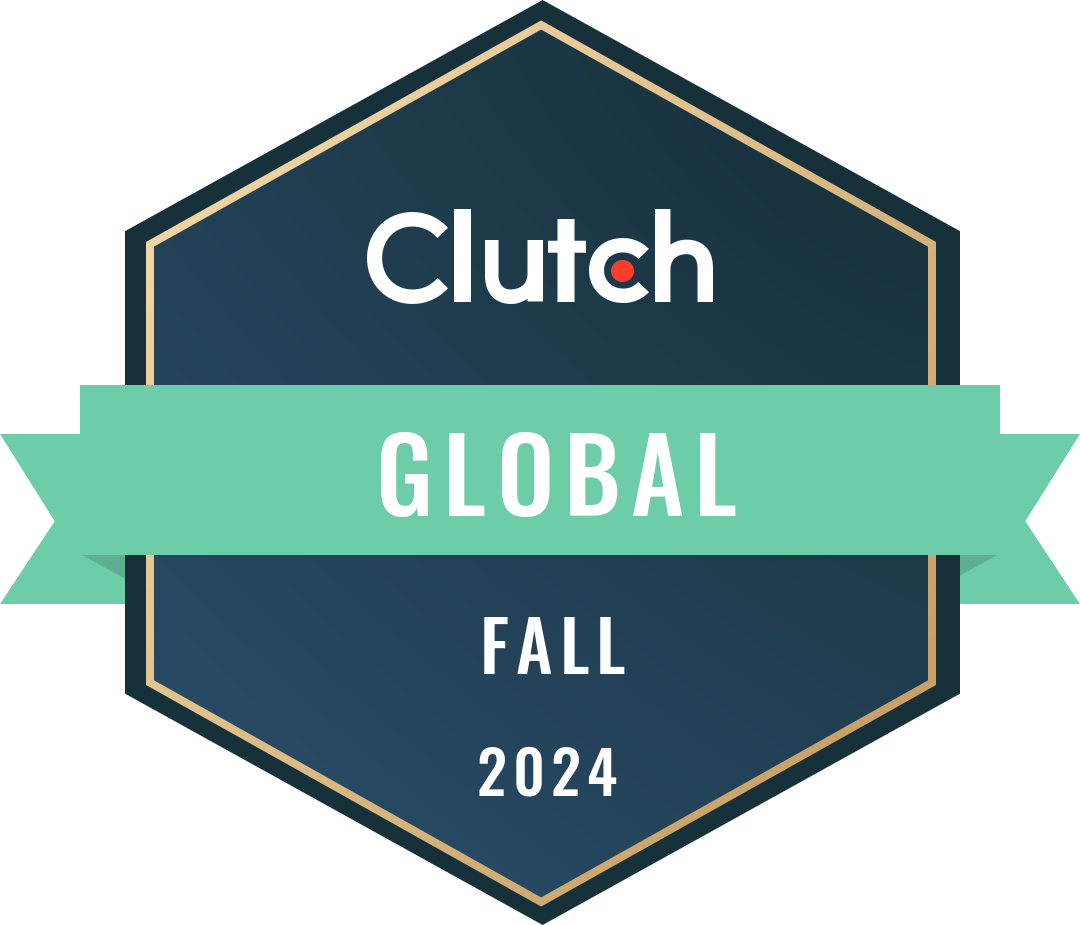Transcript
[00:00:00] Genny: Hey, what’s up marketers? Thanks for joining me today on another episode of SEO Unfiltered. Today I am joined by Joe Priest, geeky tech’s, off page SEO specialist, and today we’re talking about a super fascinating subject, which is artificial intelligence and how that is shaping the digital marketing world as we know it.
Uh, I just wanna say real quick that we ran into a few audio issues, but you should still be able to follow along. There’s just. Bits here and there where it’s a bit scratchy or there’s this weird vibration zone. Yay. Technology. Anyway, enjoy. What does it mean to be a Luddite? Today, if we even think of that term at all, it’s used to express our animosity for, or struggles with digital technology.
If you’ve ever tried to get your computer, smartphone, tablet, smartwatch, or e-reader to work, and you have to continuously appeal to the kindness of your neighbor, Work buddy or tech savvy child to help you. Then those people are probably calling you a luddy behind your back if you’re one of those people who proudly brandishes their Nokia brick.
Just so that if anyone asks how on earth you can get by in this world without a smartphone, and you proudly even arrogantly to cry, all modern technology to be the work of mega evil corporations and government agencies who are obviously surveying, tracking, and commodifying your every little move. Then you’ve probably been called a Luddite.
Maybe a less extreme example of a quintessential Luddite is someone who has anxiety about how the entire world is virtually incapable of pulling the plug, shutting down, and shutting off after all entire government systems, financial institutions, and every major industry you can think of is so heavily invested in digital technology, it’s now impossible for the world to return to a simpler, slower.
Paper and crank kind of world. If you feel that way, then maybe you’ve even called yourself a ludite. So let’s get to the bottom of this definition as the story goes. Lud, I hail from the period of England’s industrial revolution when new technology caused an explosion of industry all along the countryside.
The promise of work lured many people away from their agrarian lifestyles into city, sweaty and dangerous factories that made anything from textiles to cast iron pens to penny Dreadfuls. The Industrial Revolution virtually gave birth to the modern world, and we are still very much riding on the coattails of all that innovation.
While it all sounds like one hell of a wild ride, not everyone was impressed with all this progress. The Luddites named after Ned Lu, an active protestor who first appeared in a nodding and protest in 1811 vehemently opposed these efficient, but dangerous machines that effectively rendered these traditional craftspeople and artisans obsolete.
Mass production leads to lower costs, which suddenly makes household goods much cheaper and more affordable to more people. If profit is king, then obviously the machines are gonna win every time. The very thing we take for granted today was to these people, enemy number one. The problem with the story is that it might not actually be true.
According to many historians, the real Luddites didn’t have a problem with textile machines per se. To them, technology wasn’t the problem. So what were they fighting? The story of the Luddite sounds oddly modern. You see, they didn’t want to smash the machines because they took her jobs. They just wanted the machines to be safe, produce high quality goods, and be operated by well-trained workers who received a fair wage.
And oh yeah, there probably wasn’t a real Ned Lu anyway. for brevity’s sake. I’ll end the little history lesson here. But the last thing I wanna say about this topic is that even though the real Luddite sounded more like workers’ rights activists than technophobes, the definition of Luddite that we’ve been misusing all these years probably isn’t going to change.
Our collective anxiety about digital technology and how it has already affected and will continue to affect society is still very real. We gotta call it so, . So why not Neiman after a man who might not have even existed in the first place? By now, you might be wondering why the hell is the host of a marketing podcast talking about our fear of technology.
And the answer to that one is simple. Today I wanna talk to you about how artificial intelligence, A machine exponentially smarter than the Power Loom is going to be your next employee. I feel like there should be a drum roll or something. Anyway. Hey, marketers. Welcome to another episode of the SEO Unfiltered Podcast, your one-stop shop for all things B2B marketing and advertising, brought to you by Geeky Tech, your bullshit free SEO and PPC agency.
So let’s talk about AI for the next. If you’ve listened to our other episodes, you may have heard my grumbling about how AI is threatening to put all content writers out of work. But today I wanna shine a spotlight on those grumblings because as it turns out, AI is kind of. Awesome. Hear me out writers.
What I’ve learned recently is that AI is actually really helpful, especially when it comes to freeing up your time. And right now, as of this recording, AI has recently made a splash in the news. Yeah.
[00:05:02] Jo: So basically chat, G p t is a, is a chat bot, uh, which can answer pretty much any question that you might have.
Um, whether the answer is true or not is, is a different matter.
[00:05:12] Genny: That’s the voice of Joe Priest, geeky tech’s, off page SEO specialist. And right here he’s talking about chat, G
[00:05:17] Jo: P t I think the end of November. Um, open. Who kind of specialize in, uh, large language models, um, brought out their interface so that anybody can use what they’ve been producing.
So up until then, um, everything has always been hidden behind an api. So to actually interact with, um, everything that Open AI is doing, you would have to kind of be a programmer. So chat, G P T has opened it up to the world
[00:05:45] Genny: and since it’s opened up, its. Over a million people have been using
[00:05:49] Jo: it as it’s been trained to chat.
Um, you can answer all your questions that you might have. Um, you can ask it to write things for you. You can ask it to code, you can ask it for ideas, you can ask it to categorize things. You can ask it to build tables of data. Um, you can ask it. Pretty much to do a lot of things, but they’ve taken, you know, millions of articles, you know, Wikipedia news articles and things, and fed it into this, uh, language model.
Here’s
[00:06:13] Genny: Joe explaining to me how this chatbot works.
[00:06:16] Jo: Something that differentiates it from the things that come before and the current G p t 3.5 is that they have added, reinforced learning to it. So they have a human or a team of. Um, asking it questions and then giving it feedback to say, okay, this one is, this is a good answer.
This is not a good answer. Um, and, uh, chat, g p t actually comes from G P T 3.5 Chat. G P T is a chart of that, so it’s been kind of fine tuned to, to be able to, uh, Uh, chat basically
[00:06:46] Genny: at Geeky Tech, AI comes up in conversation a lot. So what I wanna know is, why does this particular AI tool have Google scared for contacts?
I’m talking about the New York Times article that was released in December, 2022. That has since sparked a huge conversation about chat G P T and the future of Google.
[00:07:03] Jo: At the moment, it’s very good at informational products, uh, informational queries. So if you want a question, a simple question that probably most people would know the answer to, I’d be able to give you the answer.
So, I think in the future, why would you go to Google to answer a question? Where you have to go to Google, uh, look it up, then click through to result to find the right answer. But also there’s a, there’s a few other things as well. And then of course, Microsoft, uh, a large or have bought, I think, or are buying 49% of it.
And they were originally, um, you know, they put in a billion dollars into the, into funding in the first place. So, um, you know, Microsoft are behind this. And so Google, Microsoft, there’s a big competition.
[00:07:42] Genny: Not being first to market with. The technology that’s backed by Microsoft would understandably make Google a little more than nervous.
But when it comes to the technology itself, chat, G B T still has some work to do. Remember, 30 seconds ago when Joe said this, whether the
[00:07:56] Jo: answer is true or not is, is a different matter.
[00:07:59] Genny: Like any technology in its infancy chat, g P T is still a work in.
[00:08:04] Jo: What it tells you is not necessarily, uh, the truth. So you have to make sure, or you have to fact check what it’s, what it’s putting out there.
It’s been trained on limited information, um, and the information is dated, so it only gets trained up to, I think September, 2020. One or 20 or something like that. So they’ve, there’s, they’ve impo built in this, uh, gap of information, uh, on purpose. Whereas if you look at, um, Google, um, and the information that they have at their, uh, their, their fingertips, you know, they have every single webpage, um, that you can find in Google.
So, you know, billions and billions of. Um, of information Google have, um, and they have their own models. And so what they’re, what, especially what Google are trying to do is to try and fact check everything and make sure that everything is uh, correct before they. Push it out to the kind of mass users, I guess.
Yeah, so Google have always wanted to provide the correct information, in their search. Um, and so yeah, at the moment, yeah, OpenAI haven’t quite got it yet,
[00:09:08] Genny: but the point is technology moves fast and while chat G B T may be currently outdated and a little bit flawed, it’s only a matter of time before people are using.
Instead of Google to find their answers. At least that’s Google’s fear in a nutshell. Now, marketers, if you’ve been paying attention at all, you might be thinking, holy shit, how is this gonna affect my seo? Well, it’s difficult
[00:09:30] Jo: because, you know, you know, in, in three years, I think the everything will change in three years, who knows.
But, um, even going back to Google, if you think okay, at the moment, chat, g p t might be for informational queries or for coding querie. That’s kind of in a marketing funnel, you know, that’s pretty near the top of marketing funnels. Like I just getting awareness, getting questions, trying to make a, a decision on not really making any, uh, big decisions on that.
Whereas if you get further down, uh, the final where you are trying to pick something to buy or something like that, um, that’s already disappeared or somewhat disappeared from Google. Um, people have moved over to using Amazon as a search or eBay, you know, if you’re actually trying to, if you already know what you wanna buy or you’re just looking for a new color or a new size or something, then you would probably do that search in a shopping place in, in either Google shopping or in this case, Amazon, um, or eBay.
The questions they’ll lose, so they might just be left with directions. , how to get to a. Oh my
[00:10:30] Genny: God. Well, I could kind of guess what Joe was about to say. I was actually still quite shocked when he said this, mainly because we work at an SEO firm, this is not good news. And the fact that he was being so jokey about it kind of surprised me.
but then again, Joe always has both feet firmly planted in pragmatism. But
[00:10:48] Jo: SEO in itself, it’s, it’s search engine optimization. So, um, if you are a product or a shop or something like that, then it, you’re not just, um, in the future if Google falter, then you would move over to the next search engine. You know, at the moment Google is 90% of the searches that happen.
So obviously it’s big. If it loses market share and things move over to, uh, Bing or Amazon search or you know, different search, then people will shift their concentration onto, uh, appearing well in those searches as well, uh, those search engines. So I don’t think for SEO it’s dead. I think the way people will search is, is gonna be different and where they search might
[00:11:29] Genny: be different, kind of just sounds.
The, that search engines will become eventually just obsolete as we, as they are in their current iteration. Hmm. ?
[00:11:41] Jo: Yeah. Again, I don’t, I, yeah, I don’t think so. I think if you were, I mean, in an ideal world, you would, I dunno, in an ideal world, you’d just ask something for some, for something you would ask Alexa or wherever, can you please show me the best?
And then you would get a list of the best things, wouldn’t you? Yeah. And say, oh, can you please send me that one to my door? Um, yeah. And then they would automatically charge your credit card and sign you up to a subscription and that’d be good. And that’s pretty much, you know, how much more do you wanna get from a search engine or, you know, what exactly are you trying to get out the search engine?
[00:12:17] Genny: I mean, are you talking about from the customer’s point of view or from the, a business’s point of view? . Yeah.
[00:12:22] Jo: So again, it, it depends, it depends on the intent on why you’ve gone gone to the search engine. Like if you’re gonna do shopping and stuff, you can probably do that, um, via voice or on. Particular app.
Um, if you’re looking for the best, um, optic fiber, uh, supplier or something like that, which you need to probably do a lot more research into, then people will still be there. Um, I don’t think, uh, at the moment I don’t think. Well, definitely at the moment chat, g p t can’t touch that. But there are other search engines that are, are kind of, and this is as an SEO way we might step into, is bridging the gap between, um, what Google sees and what, um, open AI
[00:13:03] Genny: pump out.
I would just wanna go back to something you had said earlier, which is that at the moment, Um, chat or open AI’s chat is not accurate. Well, not 100% accurate. You can’t guarantee the accuracy of the information that it spits out. So even if someone were to be fully on board with chat G P T, they’d still have to fact check with Google, right?
Um,
[00:13:25] Jo: not necessarily with Google, but whoever, however you would normally go about research, you would still go around. And, um, I think at the moment chat, g p t isn’t, or even is not really there to be. Um, it’s there as an assistant rather than a, as a standalone, um, writer. I think
[00:13:45] Genny: we were talking about this and you said that Google has stopped penalizing AI generated content.
Uh, so
[00:13:51] Jo: there were never penalizing it. Um, so it, what it was is they updated their, their um, guidelines. So it was that, uh, you know, generated content were, is a big no no and it still is a big no, but they removed the bit about, um, uh, AI generated content, I think. Um, and what they have done is, and it’s finished rolling out last week or a couple of days ago, is the helpful update content, helpful content update.
Um, which for many I think believes that it would be an not an attack. Uh, AI content by attack on poor quality content. So there’s a difference between, um, AI generated content that has no use to anybody that doesn’t give any information or any new information, um, and poor quality content, which again, doesn’t, um, add anything new or given in, you know, given any new information.
So it’s kind of an attack on both of those things rather than just concentrating on ai. Ai, uh, content. So it’s kind of, it, it’s what they say it’s called. It’s, it’s a helpful content update. If it’s helpful, then it won’t get penalized, whether it’s human written or AI written.
[00:15:05] Genny: Um, so when you say helpful, are you also implying accurate?
[00:15:11] Jo: Um,
No, you can get away with, uh, you can get away with. I’ve seen some odd stuff being indexed and odd stuff being, uh, ranked quite easily. Um, I think I was looking at one about, um, do bunny’s lay eggs?
[00:15:28] Genny: Do they gel? What does the AI say apparent,
[00:15:32] Jo: apparent according to Google, they can do. Yeah. Well, you know sites that appear in Google News that then yes, they can, uh, they can lay eggs, but this is the com.
This is a problem that Google are trying to combat. It’s like, can, can you tell, can they tell what is true and what’s not true? And so it kind of goes to, um, a kind of new whole search, um, or the way that you look at the internet or the way that they look at the internet. And this is where semantics come or semantic, uh, SEO comes in and things like that.
So they’re trying to join up. , um, facts and people and places and known, known, known things, uh, to each other. Yeah. They’re trying to make those connections and then build their search around those connections. Mm-hmm. rather than just words on the page, they will be able to under not understand, but they’ll be able to, uh, infer that bunnies can’t lay eggs rather than, than they can lay eggs.
[00:16:19] Genny: let’s not forget that what Joe’s talking about is AI generated content.
[00:16:24] Jo: People I know are, uh, um, although they might be using it to. Put out articles and things like that. They heavily fact check everything that comes out of. So the job it, you know, it creates new jobs in the, okay, you might not be a , might not be a writer anymore, but you’ll be an editor or a fact
[00:16:41] Genny: checker or Wait, what?
And here we have it. Chat. AI is the power loom of the 20th century. And the skilled weavers of your are now the creative writing bas, whose skills are soon to be made redundant. Yes. I’m not gonna lie, that stings. To soon be phased out by a machine that still makes huge mistakes and releases silly articles like how rabbits lay eggs kind of makes me feel like picking up a pitchfork and doing stabby stabby things with it.
But we all know from hindsight that people who resist change often live to regret it In part two, Joe’s going to walk me through how AI is changing the landscape for not only writers, but for artists and creative entrepreneurs.
So to recap, content writing as a job sector is gonna have to change, but if you look at what AI’s already been able to do, content writing is just the tip of the iceberg. What about creative sectors like art, photography or graphic design that might not seem super relevant to the people listening to this episode, but it’s also what’s on your website?
No, I, I,
[00:17:41] Jo: again, I think that you have to adapt. Um, again, it’s a tool. It’s not. It won’t replace, um, an artist. You’ll introduce new jobs for things like prompt engineering. So instead of become an artist, you’ve gotta become an artist in creating the right thing to ask the ai, oh my god, .
[00:18:00] Genny: But then does that, doesn’t that strip away the whole creative process?
Well,
[00:18:04] Jo: again, you need to know. Certain things to, to get a good image out or, you know, if you want it in a style of an artist, then you need to know who that artist is. So you need to know, um, what kind of, um, art that you like or what kind of art that you’re trying to get out of it. Um, you can also feed it your own images.
So you can create an image, um, that you’ve done and then feed it into the eye and then get it to move. Or you can then, uh, transfer it into not a movie, but eventually it will become a movie. So you could be able to, um, so animators might. Or probably already are in, in, not in trouble. But again, it’s a, it’s a tool in a toolbox.
[00:18:38] Genny: I’ll spare you the crappy audio, but what Joe is about to say is that AI is kind of like Photoshop. Remember when Photoshop first came out, photographers were pissed. Not only pissed, but they were scared. and what he’s saying is that tools like Photoshop and AI are there to help elevate your art. They’re not necessarily going to make you a better artist.
[00:18:57] Jo: You know, so the people who, who just churn out rubbish can now use a tool to help that rubbish be, um, Mediocre,
[00:19:05] Genny: but not just mediocre. Sometimes AI produces ridiculously stunning art.
[00:19:10] Jo: Proper artists, real artists who spend, you know, years perfecting their art and making sure that it’s, you know, that they’ve been doing it for years, they’ve been practicing for years.
And then, um, within it does take a bit longer than 30 seconds cuz you’ve gotta try and get the prompt right, et cetera, et cetera. But within 30 seconds you can have something that you’d be proud to stick on a, on a, on your wall. Yeah, definitely. So
[00:19:34] Genny: what do you think about that?
[00:19:35] Jo: The, well, there comes a time where the, where human costs will rise and, uh, AI becomes more viable for certain jobs.
Um, and that’s just the way that the e economics works. And it’s like, you know, human beings might outprice themselves and that would cause a shift in, um, what people do for a. Um, you know, if, if an artist who, a logo artist, so someone who makes logos, charges, I don’t know, you know, 500 or a thousand pounds for a logo, you know, obviously a lot of thought has gone into that.
Yeah. Um, you know, they’ll come up with three variations of, of, of their, their brand and, you know, kind of like that. But why not spend 30 quid on. , you know, a hundred, 200 logos that you, that are all kind of unique, kind of unique. Um, and just go through them and pick the one that you like.
[00:20:30] Genny: Even though it’s a really hard pill to swallow.
It’s kind of hard to argue with Joe’s business logic. I mean, why wouldn’t a company wanna pay less for more? But what if you’re not a logo designer? What if you don’t sell your art to businesses? Joe Hypothesizes that artists might actually benefit from all this AI art lying. Collecting
[00:20:47] Jo: art and things like that, maybe it’ll make it more valuable because there’ll be so much AI art out there than a, you know, a, a van God, or become even more valuable because it’ll be one of the last human art pieces.
But, you know, there’ll be two, it’ll be, it’ll be go both ways. Either people have to upskill and use the tools, or they’re going to have to go, um, kind of the luxury route and be up their prices and, and, and, uh, uh, market themselves as ai. Uh, Um, resistant, I guess
[00:21:17] Genny: so. So we’re talking about the art. I’m talking about art, uh, AI generated art and what it can do in 30 seconds.
It’s taken an artist years upon years of training and experience and failures to get to that same level. So why is it fair to pay less for something that takes 30 seconds than pay? What? Pay an artist. For all of that experience, even though it’s more expensive. I don’t think
[00:21:49] Jo: it’s fair, but I think it’s the way that the world works.
Uh, you know, in a, in an ideal world, you would train for years and years, you know, you become an, you know, an artist and you become, you know, the perfection at what you do. And you should be paid a lot of money. And I think people will still go down that road. Um, and, and people will still be paid a big money.
But I think for the majority of people, um, Who aren’t at that top level, who are in that kind of, you know, middle band. Why would, why would you pay for that middle band where you not getting the best. You’re getting alright, where you can pay a lot less to
[00:22:26] Genny: get, all right. What Joe’s saying kind of makes sense.
Traditional crafts like furniture making and weaving still exist. These artisans are not trying to be competitive with IKEA at all. In fact, they’re pricing their work at a luxury rate. And you know what? People are paying. Well, no, I, I
[00:22:41] Jo: just think it’s, you know, the future will be, you can’t, you can’t put this back in the box.
[00:22:45] Genny: It’s hard to argue with your point about just accepting and adapting and moving on, because just every time there’s a new innovation in any type of industry, there’s, there is a level of uproar and then it subsides and then we. Bring it on into the fold and use it and then move on, and then the next thing comes around and then we get upset that it’s changing things.
But there’s really just based on historical data points, there’s nothing we can really do to stop it, so might as well embrace it. .
[00:23:14] Jo: Yeah. And that’s, you know, people have already embraced it. People who are, are put, are putting together to te uh, putting together teams of, uh, AI generated, uh, content. Um, that’s been out for years now.
Yeah. What people are doing now is, you know, they’re, they’ve created, as I said, they’re creating the jobs for, uh, Fact checkers, editors and fact checkers, uh, and people to generate. So you still need someone to generate, you need to, you know, the outlines, the, um, and then you generate the text and it’s gotta go back to be fact checked and, and quality controlled.
So there’s a job for that control. There’s a new job for that.
[00:23:44] Genny: Yeah, I was gonna say, so the workforce of content, well, the content writing workforce won’t necessarily disappear, but it will just have to adapt alongside the technology. And I, I
[00:23:54] Jo: think just AI content alone, you still have. Make sure that it’s, um, SEO properly.
So basic on page is little there, and they will rank for something that you want it to rank. I don’t think. Um, so I think there still needs to go through those checks.
[00:24:08] Genny: So, not to sound self-serving here, but AI generated content does not replace an SEO company.
[00:24:14] Jo: Um, but if, you know, if large brands are using it now, , then you would be, I wouldn’t say foolish not to, but if you have a small site Yeah.
Um, and your competing sites who have, you know, uh, 200 pages and you need to be at that kind of level. You, you’ve got the choice of do you spend the time and a lot of money getting to that competitive stage, or do you try and cheat your way up there, uh, at a, at a lower. Um,
[00:24:44] Genny: yeah, because even if you’ve got 200, even if you’ve pushed out 200 articles, there’s still people behind it that need to run through it.
Right. You can’t just, uh, hope and pray that it’s correct. And then just do like a publishing, an upload dump of 200 posts without looking at them.
[00:25:01] Jo: Well, I think I, I kind of believe that. Well, I think. There is a limit of, um, velocity of articles that you can now pump out. Um, this is something that’s come recently, like literally if you’re doing hundreds of thousands of pages, then there is a limit and then it’ll get picked up.
[00:25:16] Genny: It’ll get picked up. And then what, what will, what will happen? Oh, yeah.
[00:25:19] Jo: It, it, they were just whole indexing it for a while or, okay. Okay. Google have put in kind of. Limits on what you can do and what, what they will crawl and, um, what you can publish and how, how fast you can publish and things like that.
Probably as a direct response of AI content.
[00:25:39] Genny: Part three, let’s see what this baby can do. I realize that my recent round of questioning kind of makes it sound like I’m not a big fan of ai, but I do agree that it’s really helpful in the workplace. So here’s Joe talking about it. But there’s other, you know,
[00:25:52] Jo: there’s other AI tools that help with fluency and grammar and things like that.
Um, uh, which we use or I use every day. Um, just to, uh, help with writing a, a letter or writing, um, something that you don’t want to write. You can just, um, quickly do an email. So anything that’s not actually associated or that doesn’t need to be detected, um, or yeah, doesn’t need to, isn’t for a search engine.
You can have, um, chat g b t write for you as soon as you are trying to publish it on the, on the internet, um, and try to get it to rank and things like that where there is someone checking whether it is AI or not. Um, that’s when you have you come into issues. You know, if you’re just writing emails back and forth to someone else, then, um, it’s becoming, it’s gonna become, uh, one click.
Um, One click, uh, conversation. And it has already become, there’s already so complete on a lot of things. And if you, uh, especially in Gmail, like you can, you can have just press a reply of one thing and, and it’ll go off. Um, but in the future it’ll be even, even better. Like, um, you’ll be able to, uh, even now you can fine tune it again.
You’ll be able to fine tune it with your tone of voice and, and the, the type of speech that you have or the, the lecturing tone you might have. Um, so that it, it will then begin to speak like you. Um, and so you then just have to feed it the original 100, 200, um, examples, and then you have a click button you, that you don’t.
All you have to do is, um, uh, read the email, click whether this answer is right or wrong, give it a quick edit and send it. Uh, obviously that will, um, Leave you with more time on your hands to actually do things. It’ll open up the opportunity for maybe a virtual assistant to come in and be in your inbox and reply in, uh, as you, um, or in your tone of voice, um, rather than you having to, uh, do that.
You know, it opens up a lot of, uh, different things. Um, and again, for social, um, so for media posts, social media posts and things like that, um, you can, uh, pass it in the kind of tone of tone of voice that you’re looking for. And you already see it. You probably, you, you see them already, like even if you don’t know that, you see them already.
They’re all the apps that generated now, um, are most likely AI generated or part two. And Kela have been doing, uh, ai, uh, generated images for ads and changing around things for, for a long time. We’ve
[00:28:19] Genny: talked a lot about, um, AI that generates content. Are there any other, um, AI tools. That, um, marketing teams can use for their seo?
That’s a
[00:28:31] Jo: difficult one. , we prefer to build our own things so we can, you can use things like G P t uh, three, um, for other uses other than content generation, so you can use it for categorization. Um, So, or you can use it for a tokenization and then use that, um, or encoding and then you can use that for categorization.
Um, you can use it for identifying intent. So what’s the intent of this keyword? So basically you can group keywords with it or you can come up with suggestions for titles, or you can come up with suggestions for other, um, keywords related to. , uh, a key word given, but
[00:29:13] Genny: if you’re, if you’re the, for example, a B2B company that does, I guess, cybersecurity, you would want to take advantage of any AI tool that will help you save time and reach more people, because it’s such a competitive industry that anything that you have in your pocket to help move your brand forward is obviously something you should take.
is that what
[00:29:39] Jo: you’re saying? And I, well, you know, cybersecurity companies already using AI , uh, in, but for their marketing, not for their mar maybe for their marketing, but they, they’ll be very aware of AI products, um, you know, uh, port scanning or anything like that, like looking for vulnerabilities that, that can be all, um, AI can, or, you know, machine learning can be used to assist that and it is already been used to assist that.
Um, so they’re well aware of the advances of technology. Um, Do they then go and import it over to, to marketing? Right. I think they should do, yeah. If you, if you’re not, or you’re not speaking to the right company that’s not using it. If you’re speaking to a company that’s definitely not using it and don’t want to have anything to do with it, then.
Um, you’re living behind the times, aren’t you?
[00:30:24] Genny: Living behind the times and not embracing technology fast enough is what killed Blockbuster, Polaroid, Kodak, Nokia, and hmv. In other words, your competitors have already jumped on the AI bandwagon, which means you can’t afford not to. Whether your hesitancy about AI is an ethical, financial, or organizational one, you’ll soon be seduced by the time savings of it all.
Yes, time savings, that’s a word. Take iki tech for. We don’t wanna show you all of our cards, but just as an example, we use something called fireflies, which is an AI note taker and meeting recorder. We don’t have to do anything but let the firefly bot into the meetings and it does the rest. So rather than having someone painstakingly take down minutes, we’ve got AI doing that task for us.
If there are other cool AI tools you can use too, if you’re in sales, for instance, a simple Google search will pull up a myriad of helpful AI tools that can help you do things like automate natural LinkedIn conversations, segment your contacts, or even speed up your outreach. And speaking of AI chats, can you imagine how many first call resolutions at customer service AI bot can handle without you?
And of course, the second you start getting into your niche, there’s an entire world of AI tools out there designed to drive efficiency and improve customer. My favorite AI tool right now is the mafia name generator. Get a load of juice subpoena, Jeremiah Juju. Subpoena Ju Jeremiah. Anyway, back to the matter at hand.
[00:31:47] Jo: Yeah, there’s loads of stuff. Um, you got translation. So translation of texts. And now even, even, uh, live speaking, you can translate. Um, into a different language as someone speaks. Um, which, which is amazing. Like if you ever think of, that’s probably not, if you ever think of like Star Trek where they have their universal communicator and stuff, but it’s literally, you can, should be able to talk to anyone in, in any language.
Um, and even Google Lens has got it. So you can, uh, take a photo or point your camera at something and ask them to see objects the same or, um, translate the text on the sign or something like that. That’s already there. But, um, even down our road, we have Starship what. Damn. My river Starship, they’re little delivery bots.
[00:32:26] Genny: No, I live in the middle of nowhere, so these things are brand new to me. like food delivery or like packages or
[00:32:33] Jo: anything? Uh, they come from co-op. Yeah. Packages. Um, so food, small food, uh, food items. They go up and down and they all get stuck at the traffic lights and stuff. Have you, so you’ve seen them.
Yeah. Yeah. They, they, they drive around my area. Uh, yeah, full time
[00:32:49] Genny: country. There’s only such a country pumpkin. Okay, so there you go. That’s, that’s a good example of helpful robots, .
[00:32:56] Jo: But is it helpful? I always think, oh, you can probably break into one of those or steal one quite, quite quickly. Are they But fact that they haven’t been abused?
Yeah, they’re a little kind of boxes and Oh, okay. I was picturing drones. No, no. They don’t fly . They, they, they’re maxed out at like four miles an hour and they can’t really. They stand up crossings for a very long time. . But, um, yeah, no AI’s everywhere. The healthcare and uh, you know, kind of protein sequencing and things like that, that’s, you know, that’s gonna be massive or is already massive for vaccines and things like that.
So it wouldn’t be possible dentistry imagery. So health imagery and things like that. Um, even just sharpening up images or expanding images, right? So you can spot things. Closer up. There’s, you know, and probably finance is one of the reasons I gotta got into it, is like, you know, everybody wants a, a bot, a robot that you can just press a button in or make money for you.
Um, You know, uh, and, and they, they, they do exist. .
[00:33:49] Genny: Mm-hmm. AI is such a huge topic and it’s moving so fast that I bet you by the time we actually air this episode, some of the information we said about chat G P T is going to be incorrect. I wonder if this is what our ancestors felt like when they realized they could harness fire.
[00:34:02] Jo: I think it’s all pretty exciting. I, you know, to try and imagine what’s gonna come in the future, especially down the route of sales or personal interaction. I think for healthcare as well. Not, not just the, the, the kind of, I’m, I’m talking more of the, the taxability and the, the language models and things, um, that rather than the protein sequencing and, and that kind of thing.
But do you think that it can be used as, um, when it comes out into, uh, voice recognition and you can actually stand and have a chat with, um, Alexa or whatever, I think. Especially for, um, people who probably don’t have a lot of family around them or lonely or anything like that. You can have conversations with, uh, uh, ai or you can then, um, or people, uh, bet people will be fine tuning things to become, um, bots for different things.
Yeah, some good, some bad. Um, but you know, if you can then suddenly automate conversations, sales con conversations and stuff, if you can fine tune, um, uh, sales calls and things like. Then you would have kind of scripts that will come out. So if, if, if customer A or prospect A says this, then it will come out with a result that will lead onto the next part.
So for sales, I think it’ll have a big impact. Like literally, um, it’ll be able to predict a way to making a sale. So manipulating people to a sale, which I think. It’s scary because yeah, in the future it will know how to how to sell anything to anybody. Um, given, uh, conversations, uh, previous conversations, um, again, with our art, we’ll turn to video and to movies.
And I think obviously there’s already been used or you know, the deep fake and changing faces and, um, putting, uh, voices. So already you can change your voice to appear younger than they are. And so I think there needs to be some sort of de obviously some sort of detection or some sort of, Protection against nefarious uses.
You know, if, if, if you can make a, so you can make images move, so you can paint a picture and, and get, get the image to move now. Um, and then that will just lead into video. So you’ll have AI generated video and they, you know, you can already change people’s faces and their mouths and make them move anyway.
Eventually that will come into proper full scale, uh, videos. And, uh, yes, you already knows that I’m a fan of vr. Um, And so it will, it will come into that world as well. Um, and then you would not just have the, the, the video, but you would have a whole location, um, generated. Um, yeah, so I think, uh, it’s gonna be huge in the future.
Um, and, and, and hopefully if it’s, if AI has , if AI has, uh, the kind of. Comes up with the goods in healthcare and stuff like that. I’ll be, I’ll live long enough to see it. It will change the world. And, and the people that will benefit are the people who have access to these, uh, tools. So if you don’t have access to it, then you’ll be a, a massive disadvantage.
And so the gatekeepers to the tool. Are gonna become the most powerful people. If you’re building things on open ai, um, in, uh, open AI is in control of what you do because obviously you’re paying them to
[00:37:11] Genny: use their api. We were nearing the end of the interview, and so I couldn’t help but ask Joe what he would say to any Luddite listening to the episode.
They
[00:37:18] Jo: would probably not be listening to a podcast . I think it will change jobs. I think jobs will be created and jobs will be lost. Um, I think technology is something that, um, is gonna help the world or has already helped the world. And it will properly save them, save the world. I think, uh, going onto a larger picture with, uh, environment and things like that, I think it will come down to, uh, technology that will, um, save it rather than the 1% preaching to the 99%.
To change.
[00:37:47] Genny: Remember how the real Luddites didn’t wanna break the machines? They just wanted the machines to make high quality goods and to be used properly by workers who are well trained and well paid. I think if we’re going to embrace AI at any scale, we’ll probably have to adopt their point of view about using machines responsibly.
The next few years are gonna be very interesting. I guess we have to stop the AI conversation at some point, but I highly recommend that you play around with the conversational AI just to see what amazing things it can do or say. I wanna thank Joe Priest for taking me down the rabbit hole of ai, even though some of the audio was a bit on the dodgy side.
And thank you listeners for joining us on this journey that started with the power Loom and ended with robot. So thank you so much for tuning into another episode of SEO Unfiltered. If you wanna learn more about AI and technology, we will be leaving a few articles and resources for you in the show notes.
Please don’t forget to follow us on Twitter, Facebook and Instagram at geeky tech geeks for all things SEO and advertising related. And lastly, listeners, just a small favor. If you like what you heard today, be sure to subscribe, like, and follow us on Apple Podcast, Spotify, or wherever you listen to your favorite shows.
That’s it for now. Peace Out Marketing Geeks.
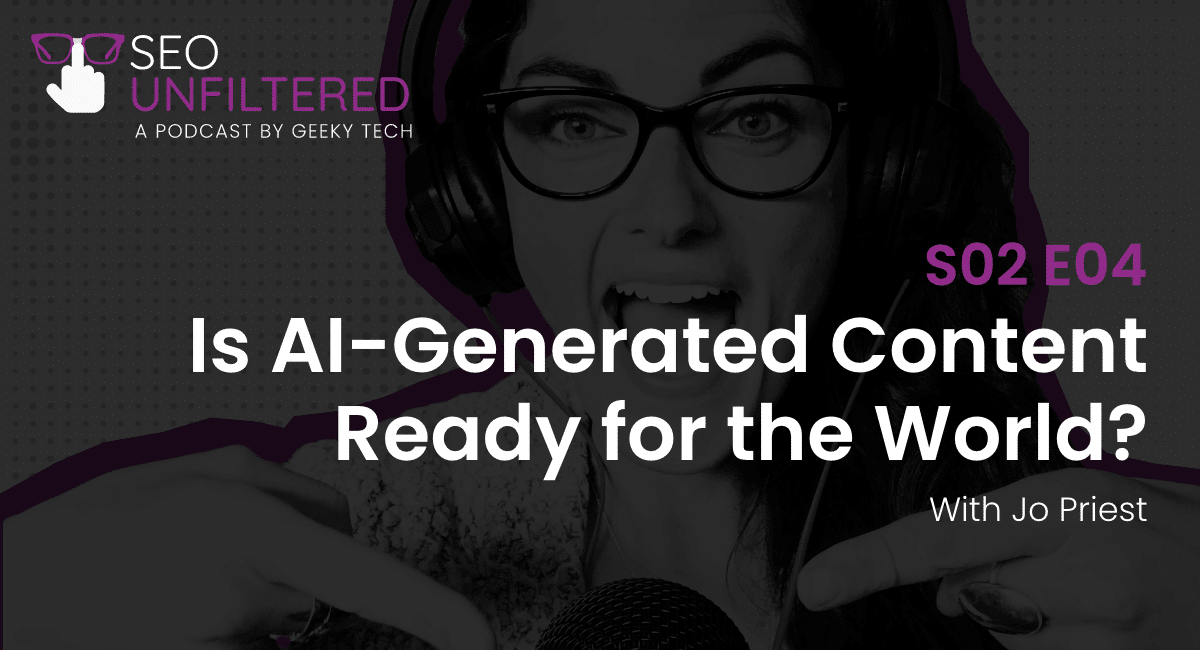
Show Notes
Artificial intelligence has been casually seeping into the workforce for decades. But it’s only been recently—since the New York Times released an article about how Chat GPT has started making Google nervous—that conversational AI is all anything anyone can talk about.
In today’s episode, Genny sits down with Jo Priest, Geeky Tech’s resident AI expert, and they discuss what’s happening in the world of AI and what Google’s doing right now to adapt to this new way people ask the internet questions.
AI, like all new technology, has sparked a philosophical and ethical debate about art and writing and how this tool will force creative people to adapt or be phased out. If history tells us anything, it’s that those who fail to embrace technology will often get left behind.
But of course, it’s not all about what AI is taking away from us. Artificial intelligence is already present in our everyday lives—delivering our food, translating our conversations, answering our emails, streamlining our workloads and even helping us live longer…yeah, it’s pretty exciting stuff.
Suggested Readings
Don’t forget to follow us on Twitter, Facebook, and Instagram @GeekyTechGeeks for all things SEO and advertising related. And lastly listeners, just a small favour: if you like what you heard today, be sure to subscribe, like, and follow us on Apple Podcasts, Spotify, or wherever you listen to your favourite shows.

